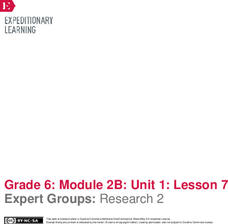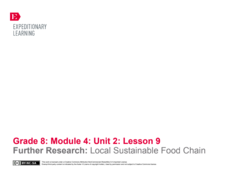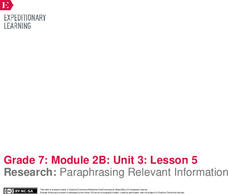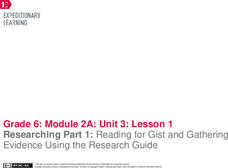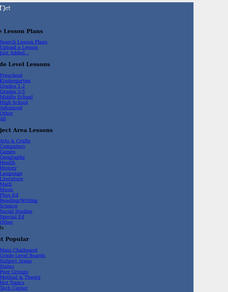EngageNY
Finding Relevant Information and Asking Research Questions: The Benefits of Video Games
Video games may not be so bad after all. As scholars read the text "The Many Benefits, for Kids, of Playing Video Games," they summarize the gist in their researchers' notebooks. Next, pupils draft supporting research questions based on...
EngageNY
Expert Groups: Research 2
Continue on. Scholars continue the research they began in their expert groups in lesson six. They read text and task cards from their research folders and share what they have gathered in research thus far. Individuals then spend the...
EngageNY
Further Research: Local Sustainable Food Chain
Researchers review how to create citations, find reliable sources, and paraphrase. Next, using guided task cards and their researcher's notebooks, they investigate the question they developed in instructional activity eight about the...
EngageNY
Researching Digital Sources, Part 1: Guided WebQuest
We are living in a technical world. Scholars learn how to examine digital resources for their research on DDT. They explore a list of websites using a Digital Resources on DDT sheet. Learners examine their research notebook to determine...
EngageNY
Further Research: Industrial Food Chain
Scholars extend their research of the food chain that Michael Pollan discusses in The Omnivore's Dilemma. They determine additional consequences of the food chain and add them to their Cascading Consequences charts. Additionally, pupils...
EngageNY
Research: Paraphrasing Relevant Information
Young writers practice paraphrasing information from Truth in Advertising? They keep an eye out for examples of false advertising as they read, recording ideas and information in their researcher's notebook along the way.
EngageNY
Forming a Research-Based Claim: Comparing Cascading Consequences
It's time to weigh the risks and benefits of screen time! Pupils work in triads to identify the strongest positive and negative consequences from their Cascading Consequences chart. Next, using the chart and their researcher's notebooks,...
EngageNY
Forming a Research-Based Claim: Cascading Consequences Charts
Life is all about choices and consequences. Using a Cascading Consequences chart, scholars create a visual map of the effects of a particular choice or action related to water management. With their researcher's notebooks and copies of...
EngageNY
Researching Part 2: Reading for Gist and Gathering Evidence Using the Researcher’s Notebook
The gist should be short and sweet! Pupils practice finding the gist of an informational text and then write a summary of the text. Next, they gather with their research teams to discuss a focus question based on the novel Bud, Not Buddy...
Curated OER
Research Skills: Evaluating Information and Sources
While this focuses on Ancient Rome, the objectives are improved research and information evaluation skills. In one class period, class members narrow their topic, research it, select the best information, log useful sources, and discuss...
The New York Times
Collateral Damage? Researching a Connection Between Video Games and Violence
Hook your class into an exploration of and discussion about violence in video games with a cute animal clip and a video game trailer. After a quick discussion about how media can affect mood, class members read a related article and...
EngageNY
Finding Relevant Information and Asking Research Questions: The Big Thirst
Let's get to the gist. As scholars continue their study of Charles Fishman's The Big Thirst, they practice writing the gist of the text. Additionally, pupils add notes about the industrial uses of water to their researcher's notebooks.
Curated OER
Maintaining a Research Notebook During the Research Process
Students discover how to keep all of their research work in a notebook. This instructional activity shows students how to stay organized during the research process, as well as providing students with a graphic organizer for their work.
EngageNY
Individual Research
Seventh graders get the option of choosing their own text from a selection to read and gather more information as part of their research. Learners discuss the difference in reading for research and reading for pleasure. They also begin...
EngageNY
Setting Purpose for Research: What are Fair Working Conditions?
Life may not be fair but working conditions should be. Scholars research working conditions at Wegmans by studying the company website. They complete a working conditions anchor chart and discuss their findings in a think-pair-share...
EngageNY
Researching: Asking the Right Questions
Learners look over the iCare about the iPhone performance task and discuss how it relates to working conditions. They then review the research process and place focus on the step of asking questions. Finally, scholars ask questions to...
EngageNY
Researching Part 1: Reading for Gist and Gathering Evidence Using the Research Guide
If only life came with an owner's manual. Pupils assemble with their research teams to discuss which of Steve Jobs' rules to live by most resonates with them. Scholars also read informational texts in pursuit of finding the gist and...
EngageNY
Resource Materials and Gathering Information: Reading Another “Choice” Text from the Research Folder
Look it up. Scholars use a dictionary and thesaurus to verify the meaning of the research vocabulary words they defined in the previous activity. They then use sticky notes to write a synonym for each word. Finally, individuals choose a...
EngageNY
Applying Research Skills: “Rachel Carson: Environmentalist and Writer”
It's important to cite sources! Scholars take a closer look at their research about DDT by examining how to cite sources. Learners take turns sharing information that would be used to cite sources to complement Rachel Carson:...
EngageNY
Gathering Information about Screen Time: Assessing and Reading Internet Sources, Day 2
Calling all researchers! Using the resource, scholars continue conducting independent Internet research about a chosen research question. As they browse the web in search of articles to answer their questions, pupils paraphrase their...
EngageNY
Gathering Information about Water Management: Assessing and Reading Internet Sources, Day 1
It takes time to discover what makes a source accurate and credible. Using everything they've learned about source credibility, scholars begin researching supporting questions about how industry and agriculture manage water. They select...
EngageNY
Gathering Information about Water Management: Assessing and Reading Internet Sources, Day 2
Accuracy, credibility, timeliness ... it's time to act on source reliability! Pupils continue conducting Internet research, selecting two questions about water management from their researcher's notebooks that they want to explore...
Curated OER
Lesson Exchange: Introduction to Research Papers (Senior, Literature)
Although unlikely in today's English classroom, this lesson focuses on introducing research papers to seniors in high school. It briefly reviews the parts of an essay, and mentions showing learners example essays, but no examples are...
Curated OER
Introducing Biographies - Getting to Know You
Students explore several different types of biographies to determine their area of interest, choose one notable person they would like to explore, complete online tutorial on biographies, and use written and Internet resources to...



